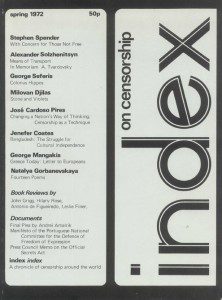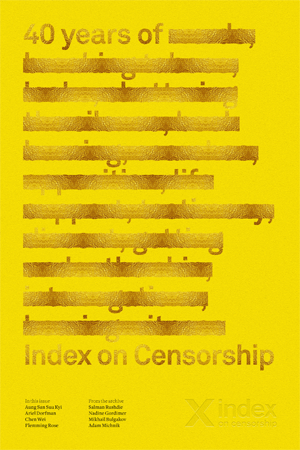 Robert McCrum considers Index’s role in the history of the fight for free speech, from the oppression of the Cold War to censorship online
Robert McCrum considers Index’s role in the history of the fight for free speech, from the oppression of the Cold War to censorship online
In February 1663, the London printer John Twyn waited in Newgate prison for his execution, the unique horror of being hanged, drawn and quartered at Tyburn, the place known today as Marble Arch. This medieval agony was the recently restored monarch King Charles II’s terrifying lesson to his subjects: do not write, or print, treason against the state.
Even more cruel, Twyn’s offence was merely to have printed an anonymous pamphlet justifying the people’s right to rebellion, “mettlesome stuff” according to the state censor (the King’s Surveyor of the Press). No one suggested that Twyn had written this treason, only that he had transformed it from manuscript to print. Perhaps he hadn’t even read it. Never mind: he was sentenced to death.
Pressed both to admit his offence and reveal the name of the pamphlet’s anonymous author (and thereby save his own life), Twyn refused. In words of breathtaking courage that echo down the centuries, he told the prison chaplain that “it was not his principle to betray the Author”. Shortly afterwards, Twyn went to his doom. His head was placed on a spike over Ludgate, and his dismembered body distributed round other city gates.
Words can be weapons, and the pen challenges the sword. Writers, and printers, “the troublers of the poor world’s peace”, in Shakespeare’s phrase, have always seemed a danger to the state. Across Europe, for the first three centuries of the printing press, questions of religion and politics were usually settled by the authorities of the day with rare and explicit savagery. As John Mullan has shown in his excellent monograph Anonymity, the safest course for the dissident writer was a pseudonymous or anonymous cloak of identity.

Eventually, the Romantic assertion of the heroic individual’s place in the world at the beginning of the 19th century ended this prudent convention, but slowly. The scandalous first two Cantos of Don Juan were printed without naming either Lord Byron or his publisher, John Murray. Despite the risks, the poet soon found fame irresistible. “Own that I am the author,” he instructed Murray, “I will never shrink.” By the reign of the fourth George, Britain’s liberal democracy was never likely to eviscerate, hang or decapitate a transgressive writer, though some terrible penalties did remain on the statute book for decades to come.
Abroad in Europe, as repressive states, notably Tsarist Russia, grew harsher, the fate of writers worsened, but hardly varied. The essential predicament was unchanged from John Twyn’s day. Putting black on white, words on the page, as accurately and truthfully as one could, would never fail to make trouble with vested interests, arterio-sclerotic authorities and evil despotisms. Dostoevsky was marched before a firing squad, but reprieved. The distinguished list of writers, before the Cold War, who died for their art includes Osip Mandelstam and Isaac Babel, possibly the greatest loss of all.
Writers and despotic regimes
By the middle of the 20th century there was, in the words of Graham Greene, a fairly general recognition that “it had always been in the interests of the State to poison the psychological wells, to encourage cat-calls, to restrict human sympathy. It makes government easier when people shout Gallilean, Papist, Fascist, Communist.” In the same essay, on “the virtues of disloyalty”, Greene expressed the writer’s credo in an age of growing state control. “The writer is driven by his own vocation,” he said, “to be a Protestant in a Catholic society, a Catholic in a Protestant one, to see the virtues of the Capitalist in a Communist society, of the Communist in a Capitalist state.” Greene concludes this celebration of opposition by quoting Tom Paine: “We must guard even our enemies against injustice.”
Confronted by the intractable collision of the creative individual of fiery conscience with the frozen monolith of the powers that be, there is one essential question: What Is to Be Done? In 1968, the poet Stephen Spender, sickened and dismayed by reports of literary repression in Russia, Czechoslovakia, Greece, Spain, Portugal, Brazil and South Africa (as well as several recently decolonised African states), responded to the spirit of a revolutionary year. He decided to organise a fight-back, setting the pen against the sword, based in London.
George Orwell had already pointed out, in his 1946 essay “The Prevention of Literature”, that “literature has sometimes flourished under despotic regimes, but the despotisms of the past were not totalitarian”. In fact, it was the totalitarian regime of the USSR, and its trial of Yuli Daniel and Andrei Sinyavsky, that proved the tipping-point for Spender. He was joined by Pavel Litvinov, the Soviet scientist, dissident and human rights activist, who wrote an open letter asking if it might not be possible to form in England an organisation of intellectuals who would make it their business to publish information about what was happening to their censored, suppressed and imprisoned colleagues abroad. Litvinov was inspired by the fates of fellow Russians, but he insisted that such an organisation should operate internationally and not just concern itself with victims of Soviet oppression, though their plight was possibly the worst in those dark days of the Cold War.
Spender, who was exceedingly well-connected, organised a telegram of support in response to Litvinov’s appeal, signed by an awesome roll-call of the great: Cecil Day-Lewis, Yehudi Menuhin, WH Auden, Henry Moore, AJ Ayer, Bertrand Russell, Julian Huxley, Mary McCarthy, JB Priestley and his wife Jacquetta Hawkes, Paul Scofield, Igor Stravinsky, Stuart Hampshire, Maurice Bowra and George Orwell’s widow, Sonia. These, and subsequently many others, declared they would “help in any way possible”.
This initiative led, in turn, to the formation of the Council of WSI (Writers and Scholars International), whose founding members included David Astor, editor of the Observer, Elizabeth Longford, Roland Penrose, Louis Blom-Cooper and Spender himself. Index on Censorship was born when Michael Scammell, an expert on Russia, came up with the idea of founding a magazine. Thus was the ongoing battle for ‘intellectual freedom’ moved onto new terrain best suited to writers and scholars — the printed word published in a little magazine. Soon, the advantages and benefits of fighting oppression from a dedicated bastion of free expression became obvious to both sides, free and unfree alike.
A clarion voice in the fight for free speech
Index, whose first issue appeared in 1972, declared that its aim was to “record and analyse all forms of inroads into freedom of expression”. Further, it would “examine the censorship
situation in individual countries” and would publish “censored material in the journal”. In the long and bloody history of the fight for intellectual freedom there had been many impassioned statements of principle about the writer’s role as a piece of grit in the engine of the state. No one, however, had ever thought to jam a whole toolbox into the machinery of power, and place a fully-funded institution (such as WSI) in direct opposition to the repressive intentions of despotic regimes. This was the unique and historic importance of Index. But its success was not a foregone conclusion. Spender, its founder, was fully alert to the potential for windbaggery and failure inherent in such a venture. There was, he wrote, “the risk that the magazine will become simply a bulletin of frustration”.
Actually, the opposite came to pass. Index became a clarion voice in the cause of free expression. The abuses of freedom worldwide in the 1970s were so appalling and so widespread that the magazine rapidly found itself in the frontline of campaigns against repression and censorship in Russia, Czechoslovakia, Latin America and South Africa. Alongside Amnesty International and the PEN Club, Index gave vivid expression to the truth that “censorship” today takes many cruel forms: writers who are sent to labour camps, or blackmailed by threats to their families, or harassed into silence and isolation.
Perhaps the most important thing Index did, from the beginning, was to universalise an issue that was in peril of becoming a special interest: freedom was not “a luxury enjoyed by bourgeois individualists”. Along with self-expression, it was a human right, and an instrument of human consciousness that should be fought for worldwide.
Historically, the classic polemical statement against censorship, John Milton’s Areopagitica, a pamphlet against the Licensing Order of 1643, had focused on the English Parliament’s threat to a free press. Milton, writing in the midst of Civil War, was less worried about blood than ink: “Who kills a man kills a reasonable creature, God’s image,” he writes, “but he who destroys a good book, kills reason itself.” Three centuries later, Index would concern itself with both the breath of the oppressed writer but also the lifeblood of liberty, namely, free expression.
In an astonishingly short time, barely a generation, from 1972 to 1989, the magazine established itself as a force to be reckoned with. At first, it took up the issue that had inspired its beginnings: Soviet oppression. In defence of Alexander Solzhenitsyn, Index published part of a long, autobiographical poem, “God Keep Me from Going Mad”, composed in 1950-53 while Solzhenitsyn was serving a sentence in a labour camp in North Kazakhstan, the setting for One Day in the Life of Ivan Denisovich. This was followed by a scoop in 1973, the unexpurgated text of an interview Solzhenitsyn had given to AP and Le Monde in which the writer revealed that “preparations are being made to have me killed in a motor accident”.
Václav Havel, Solzhenitsyn and the Iron Curtain
The importance of this document, one of the writer’s very rare accounts of his predicament, is that it described in horrifying and particular detail the true nature of the Soviet regime’s campaign against him, especially the constant surveillance and the unrelenting menace of the state’s agents. Solzhenitsyn was also able to draw attention to the persecution of Andrei Sakharov. In the bleakest depths of the Cold War, taking up the cause of Russia’s dissident community made the difference between international recognition and utter oblivion.
As the magazine grew in confidence, it began to focus on other, related injustices behind the Iron  Curtain, notably in Czechoslovakia (as it was). It was among the first to publish the banned playwright Václav Havel in English. In 1976, a retrospective on Czechoslovakia eight years after the Soviet invasion of Prague described how Havel was being “constantly harassed and persecuted by the authorities”, the beginning (as it turned out) of a long assault on Havel’s liberty.
Curtain, notably in Czechoslovakia (as it was). It was among the first to publish the banned playwright Václav Havel in English. In 1976, a retrospective on Czechoslovakia eight years after the Soviet invasion of Prague described how Havel was being “constantly harassed and persecuted by the authorities”, the beginning (as it turned out) of a long assault on Havel’s liberty.
When Charter 77 was formed the following year, Index became a vital link in the chain of communication between the samizdat literary community in Prague and the wider world. The exiled Czech journalist George Theiner, who succeeded Michael Scammell as editor, strengthened this link. Context and continuity, the steady accumulation of a body of work and opinion, are vital ingredients in any effective campaign on behalf of oppressed writers. Index now provided both a sober and authoritative framework for its protest and also, through the office in London, a team of journalists dedicated to monitoring the devious and sinister machinations of oppressive regimes worldwide.
In the 1980s, the magazine spread its wings. There were exposés of repression in Latin America and persecution in Africa (Kenya, Nigeria). Roa Bastos, who had suffered so badly in Paraguay, found a new champion. Nadine Gordimer, who had supported Index from the beginning, published a story about the romantic dilemmas of a secret policeman in South Africa. In Europe, Samuel Beckett became so engaged with the plight of Václav Havel that he dedicated a short play, “Catastrophe”, to his fellow playwright and allowed Index to publish it in its pages, another notable scoop. By the end of the 1980s, the idea of standing up for the abstract idea of ‘intellectual freedom’ by reporting censorship and publishing banned writing had become a recognised part of the common discourse within the libertarian community.
The influence of Index on the literary world has been at once subtle and impossible to overstate. In my mind, there is no doubt that its example became an inspiration to those British publishers, like Faber, Penguin and Picador, who (especially in the 1970s and 1980s) published banned or oppressed writers such as Milan Kundera, Václav Havel and Josef Skvorecky. The literature that came from behind the Iron Curtain added a new dimension to the reading of the West. Translations of novels like The Book of Laughter and Forgetting were so exceptional that the book would briefly become, ex officio, as it were, almost a part of the Anglo-American literary tradition.
The institutional importance of Index is hard to overstate because, in the words of André Gide, good sentiments do not usually generate good literature. Just because a writer is committed to fighting injustice in his or her society, there’s no guarantee that his or her work will have artistic value. But once the role of literature as “witness” is established in the minds of the public, it makes it more difficult to dissociate literary merit and the social or political value of the text. Index provided a forum for banned writers to demonstrate the role of literature, both good and less good, as unsubmissive, contrarian, transcendent and instinctively transgressive.
Perhaps it was as well that the Index model was so firmly set by Spender and its founders. After 1989, the strength and security of WSI (notwithstanding a constant search for sponsors) was crucial. The fall of the Wall and the disintegration of the Soviet Union gave every indication that the raison d’être of Index — opposing Soviet oppression — had been trumped by History.
New frontiers for free expression — and censorship
In fact, the reverse was the case. Writers and free expression continued to be persecuted worldwide. Russia did not cease to be despotic with the disbanding of the KGB. In some ways, the condition of everyday life for Russian writers grew significantly worse, and certainly far more dangerous. The war in Chechnya gave the authorities a new pretext to crush free journalism. Anna Politovskaya became just one of many who turned to Index to make her plight better understood in the West.
With the millennium, meanwhile, the rise of the internet and the IT revolution inherent in the development of digital communications offered a new challenge. The old barriers to state control were coming down. Frontiers that had once been impenetrable were suddenly porous. Secret policemen could continue to terrorise writers, printers and publishers, but it was much harder to stop the free flow of information on the worldwide web. What place would Index have in the new world order of “free” content shaped by Google, Wikipedia and Amazon? The answer, of course, is as a research institution, a memory bank and a continuing moral example, along with publishing online as well as in print.
Index in the new century has made the fight for “intellectual freedom” normative as well as liberating. WSI remains the tool of one very simple, good idea. Its historical board members are unchanged: Milton, Paine, Wilkes, Zola and, possibly, Orwell. Index knows that such an achievement is not lightly won. The history of state repression shows that the individual writer and artist and scholar is vulnerable on his own. He, or she, needs the committed support of independent organisations that cannot be crushed by state terror. Furthermore, the plight of writers especially should not be at the mercy of intellectual fashion or the caprice of a Twitter feed. Free expression needs its gatekeepers: publishers, editors, booksellers, and independent columnists. And this community needs a place to meet, a forum for ideas and debate. This is what Index provides. More serious than Twitter; better organised than Facebook, it’s a forum that can exploit the social media, but not become its prisoner.

In the 21st century, this can be virtual, articulated through Google or Wikipedia. But it also needs to be orchestrated by people, standing apart from fashionable trends, who understand the nuances of the fight for intellectual freedom and who know what they are talking about. This, in a sentence, is the unique Index proposition: ideas honestly and freely expressed and writers worldwide uninhibited by the censorship of the mind or tyrannical restrictions on the printed word.
This article appears in 40 years of Index on Censorship which marks the organisation’s 40th anniversary with a star line-up of the most outstanding activists, journalists and authors. Click here for subscription options and more
Robert McCrum is an associate editor of the Observer. He has been a member of the advisory board of Index on Censorship since 1983




